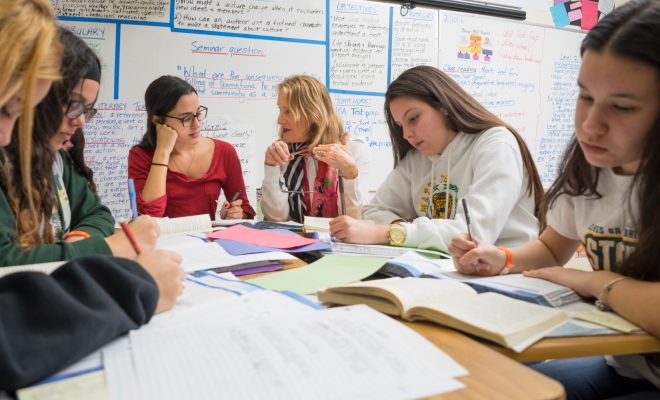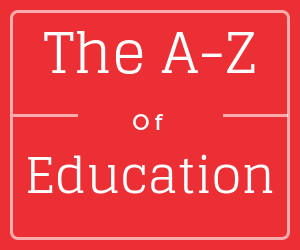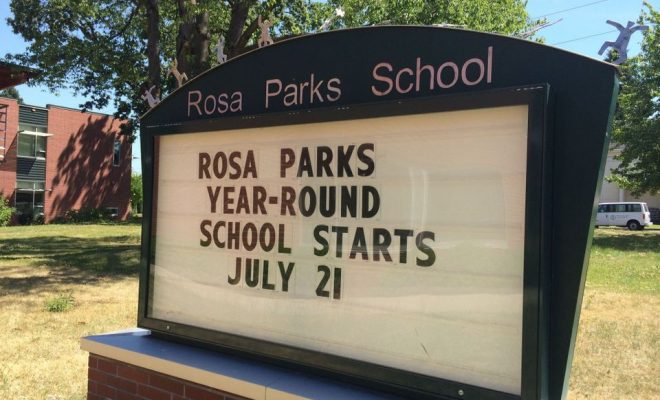Understanding Academic Language and its Connection to School Success

Carlyn Friedberg, MS, CCC-SLP, Assessment Specialist, Lexia Learning
Alison Mitchell, Ph.D., NCSP, Director of Assessment, Lexia Learning
Elizabeth Brooke, Ph.D., CCC-SLP, Chief Education Officer, Lexia Learning
As students progress through school, they are expected to demonstrate increasing levels of sophistication in their language and reading skills across all content areas. In order to gain knowledge through independent reading and participate in meaningful discussions in the classroom, students must master the complex words and phrases that characterize the language of school. Proficiency in these skills, otherwise known as academic language, is critical for reading comprehension and overall academic success.
Across the country, educators and policymakers have begun to acknowledge the importance of academic language, as well as its notable absence from curriculum and assessment. Recent national and state standards reflect a shift towards academic language by calling for instructional focus on words that appear across content areas, as well as opportunities for students to develop knowledge of words and concepts through discussion and reading (Baker et al, 2014). Students must be able to determine the meaning of unfamiliar words, understand nuances in word meanings and multiple meaning words, and utilize sophisticated words and phrases, including transitions and precise word choice (National Governors Association Center for Best Practices & Council of Chief State School Officers, 2010). These demands are particularly challenging for students with impoverished experience or limited exposure to English.
Many students struggle with academic language because their exposure to language outside of school does not include advanced words and phrases. The transition to “school talk” poses a particular challenge for English Language Learners (ELLs) since they must simultaneously develop everyday language already familiar to their monolingual peers, along with academic language skills (O’Brien and Leighton, 2015). Without exposure to advanced English language skills at home, ELLs face double the demands of language learning. Increasing numbers of ELL students attending schools across the country, as well as significant numbers of students from low income backgrounds and those with learning disabilities, have made it an educational imperative that instruction and assessment directly promote students’ academic language proficiency.
What is Academic Language?
The term academic language may be used to refer to formal English rules, structure, and content for academic dialogue and text, and the communicative conventions that allow students to meet the demands of school environments. A concise definition refers to academic language as “the specialized language, both oral and written, of academic settings that facilitates communication and thinking about disciplinary content” (Nagy & Townsend, 2012). For actionable, instructional purposes, these specialized language skills include advanced vocabulary and syntax that help students unlock key elements of both oral and written language. These skills support the listener or reader in gaining a rich understanding of the message being delivered.
What are key elements of Academic Language?
Vocabulary and syntactic knowledge in oral and written language encompass specific skills that allow students to meet academic demands across the curriculum. Though commonly used to denote breadth of knowledge of word definitions (i.e., how many words a student knows), vocabulary knowledge also refers to depth of understanding of word parts (prefixes, suffixes, roots), multiple meanings, and figurative language that shape the subtleties of vocabulary use. Proficiency in word parts and relationships helps students acquire new vocabulary, reason about the meaning of unfamiliar words, and comprehend the sophisticated vocabulary that characterizes academic language, including:
- Morphologically complex words (words with multiple parts, including prefixes and suffixes) e.g., comfortable; prediction; reconciliation
- General-academic words that are high frequency and may be abstract or have multiple meanings, e.g., investigate; principle; asylum
- Discipline-specific words that typically contain Greek combining forms, e.g., ecosystem; longitude; integer
Syntactic knowledge refers to the understanding of parts of speech and rules that govern how words and phrases combine into sentences, and how sentences combine into paragraphs. To comprehend connected text, students must master basic grammatical rules as well as sophisticated knowledge of words and phrases that are used to establish referents, organize ideas, denote relationships between concepts, and develop text cohesion, including:
- Use of connective words requiring sentence-level inferencing, e.g., consequently; whereas; similarly
- Resolution of pronoun reference, e.g., We examined the extent to which native plants in coastal regions adapted to climatic changes in their (The reader needs to connect the pronoun their to the noun native plants)
- Grammatical agreement between subjects, verbs, and tense, e.g., All of the candidates, as well as the current President, are attending the televised debate.
Given the increasing emphasis on students’ abilities to independently engage with complex text, perhaps the domain most impacted by students’ academic language skills as they progress through school is reading comprehension. In fact, researchers have shown that reading comprehension difficulties are in large part due to students’ challenges in understanding the academic language of school texts (Uccelli et al, 2015). Vocabulary knowledge particularly predicts students’ literacy achievement, because it contributes significantly to both word identification and reading comprehension skills. In addition, vocabulary and syntactic knowledge have been shown to account for the majority of individual differences in reading comprehension performance for students in upper elementary school through high school (Foorman, Koon, Petscher, Mitchell, & Truckenmiller, 2015). Vocabulary knowledge and syntactic knowledge help students engage with text and progress towards deep reading comprehension with increasing independence by supporting their abilities to:
- Acquire knowledge through reading and synthesize it with previously learned material
- Analyze audience, structure, purpose, and tone of texts
- Evaluate evidence, main ideas, and details in what they read
How do you teach Academic Language?
Instruction in academic language supports students’ access to content across all subject areas. Because the functions and structures of students’ home languages can significantly affect their reading comprehension, even when their first language is English (Westby, 2005), this instruction must be explicit and structured. Using language from the curriculum, educators of all disciplines can provide students with repeated exposure to and application of high-utility vocabulary words, both general-academic and discipline-specific, instruction in word-learning strategies and word relationships, and practice with complex syntactic forms.
In order to maximize the impact of academic language instruction, educators need to first understand their students’ specific language competencies. Educators should assess students’ knowledge of word associations, use of structural analysis, and abilities to make connections and inferences within and across sentences. In addition, evaluating both academic language and reading comprehension skills through use of authentic academic texts will help educators to identify students who need support coordinating vocabulary and syntactic knowledge with comprehension strategies. By assessing students’ skills before, during, and after teaching academic language, educators can collect actionable data that helps identify which students are likely to be successful or at risk for academic difficulty and what areas to target in instruction.
Academic Language Instruction for Early Elementary Students
Students need a strong foundation in age-appropriate language to aid their comprehension and expression in the classroom and support them towards engaging with more complex language as they progress through school. For early elementary students who are learning to read, academic language can be taught via oral language instruction. As students’ reading skills develop, they can apply their knowledge to text. Educators can leverage younger students’ natural enthusiasm for learning new words and participating in discussions to teach vocabulary and syntactic skills using the following strategies:
- Foster a language-rich classroom that includes opportunities for students to learn and apply new vocabulary when following directions, describing, participating in conversations, and listening and responding to stories.
- Provide explicit instruction in word relationships and categories, high-utility vocabulary (e.g., spatial, relational, temporal, and descriptive words), and content-area words.
- Teach word-learning strategies for acquiring new vocabulary, including the use of sentence-level context clues and word analysis skills.
- Demonstrate self-monitoring of comprehension when encountering complex language and ideas in texts read aloud.
Academic Language Instruction for Upper Elementary and Secondary Students
As students approach third grade and beyond, extracting relevant meaning while reading becomes more essential but challenging as students encounter texts that are increasingly complex and diverse (Nagy & Anderson, 1984). To meet these challenges, upper elementary and secondary students need instruction in more sophisticated academic language skills, including advanced vocabulary and grammatical structures. In particular, instruction in words and phrases that contain Greek and Latin word parts are essential to academic success (Corson, 1997), as 60–90% of words found in academic contexts contain these forms. Illuminating the connection between the root “struct” and the words “instruct,” “construct,” and “destruction” not only provides a key to the meaning of those words, but may also inspire students to engage with future novel words in an inquiring manner. Educators can help older students build their vocabularies, learn ways to reason about unfamiliar words, and think critically about what they have read with the following strategies:
- Teach students about the morphological structure of words (prefixes, suffixes, and base/root words) and how words are joined together. Transitioning students’ thinking from “I don’t know the meaning of this word” to “What parts of this word do I recognize?” has the potential to generate a more active approach in a student’s response to spoken and written language.
- Before students read class selections, preview and pre-teach vocabulary that will be important for their comprehension of the text, and provide semantic maps (graphic organizers or “webs” that connect new vocabulary to related words and concepts) when teaching new words.
- Combine exposure and modeling with guided practice and independent, repeated oral and written application.
In addition to developing vocabulary, students need explicit instruction in the ways that words connect to other words, phrases, and concepts; new words must be learned and applied alongside the language structures within which they appear (Nagy and Townsend, 2012). With opportunities to read, write, say, and hear language that varies in form and function across contexts, students can internalize syntactic knowledge skills. In particular, focusing on connective (or “signal”) words and phrases in text can help students interpret relationships between ideas within and across sentences, clarify what they have already read, and provide clues to what they will read. To teach syntax skills, educators can use the following strategies:
- When discussing texts, coach students through the meaning of sentences that require careful interpretation, especially those that require connections or inferences about multiple ideas.
- Provide students with sentence frames that chunk complex sentences into meaningful phrases and demonstrate how changes in word choice and order affect meaning, subject-verb agreement, and pronoun usage.
- Enhance lessons and conversations using academic language with pictures, video, and other multimedia to help students with language weaknesses connect definition and function to concepts and their current background knowledge.
Summary
Through targeted assessment and explicit instruction in academic language, educators have the power to impact students’ vocabulary knowledge, syntactic knowledge, and, subsequently, their reading comprehension. Although this instruction is particularly critical for struggling readers and English Language Learners, all students will benefit from targeted instruction in the words, phrases, and forms that constitute academic texts and discussions. While teachers’ classroom practices support students individually, school leaders can bolster language gains through selection of curriculum, assessment, and professional development opportunities that target this goal. A unified mission around academic language helps districts and schools improve students’ likelihood of educational success and provides students with the tools they need to comprehend their world, in school and beyondReferences:
Click here to access the references for this whitepaper.






